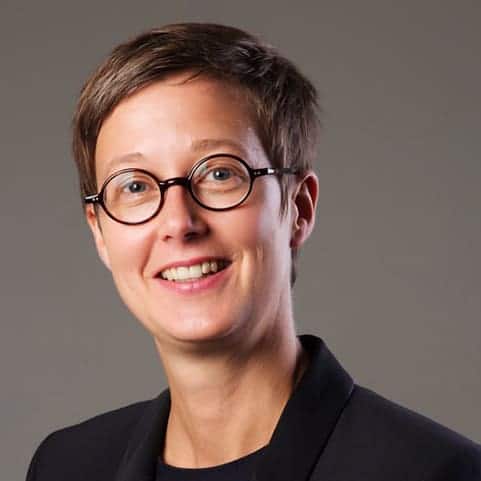NEW IDEAS IN COMPLEXITY SCIENCE
On May 24th, 2018, the First External Faculty Meeting of the Hub started with a public conference.
In short talks complexity scientists from all around globe shared their visions on the question “Complexity: Where do we go from here?”
What are the open, the most pressing, the most promising questions to an understanding of complexity and Big Data?
Find the talks of all conference participants (in order of appearance) on our Youtube channel in the playlist of the conference.
An overview with photographs of the event and links to all available slides can be found here.
KAROLINE WIESNER
“UNDERSTANDING A COMPLEX SYSTEM IS NOT JUST ABOUT DATA COLLECTION, IT’S ABOUT UNDERSTANDING AND DEFINING THE QUESTION”
Karoline Wiesner is the co-director of the Bristol Centre for Complexity Science an associate professor at the University of Bristol, UK, and currently researches Shannon’s mathematical theory of communication applied to complex systems. Her presentation looks at predicting extreme events in complex systems such as the political or financial system.
Predicting extreme events is very difficult, because they are so rare, says Karoline, alleging several examples of failed predictions. The most famous is probably the one by Ben Bernanke, head of the US Federal Reserve. At the start of 2008, Bernanke announced that they were not predicting a recession. We all know what happened next.
Karoline asserts, however, that predicting such events is not impossible.
The mathematical equation, 1/x[square]—the finite time singularity—, is a good place to start. The curve this equation makes shows a dramatic upturn. The closer x gets to 0, basically, it explodes. If x is time, one can use it for predictions, Karoline says. The ETH Zurich for instance applied it to property prices in the US and predicted a recession in 2006. “Maybe not exact,” she says, “but pretty close.”
Another group, Freedom House, is using the principle to track democracy. Freedom House has found that Hungary and Poland have been getting steadily worse since 2005. The European Commission recently launched legal proceedings against Poland for breaches of democratic principle, again, proving the approach to work.
One problem Karoline has found is determining the questions to be asked. In a workshop in 2018 for instance, that brought physicists, political scientists, economists, psychologists, mathematicians, philosophers and computer scientists to Bristol, Karoline found that everyone had a different definition of a stable democracy. Understanding a complex system therefor “is not just about data collection,” she concludes. “It’s about understanding and defining the question.”
CLICK FOR KAROLINE’S SLIDES.
See the video in full lenght here:

